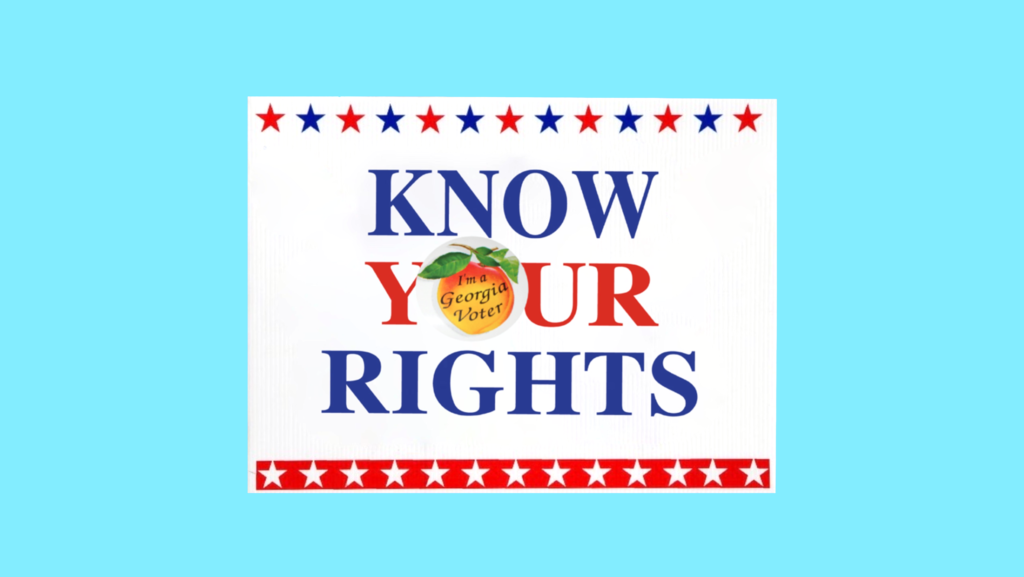Georgia Voters! Know Your Rights.

The Georgia Senate runoff elections are tomorrow! If you’re planning to vote in person, it’s important to understand your voting rights and know how to exercise them at the polls.
But before you head to the polls, be sure to:
1. Check your registration.
Confirm you’re registered to vote and that your registration is active. Even if you voted in November, make sure to double check the status of your registration.
2. Confirm your polling place.
Make sure you’re going to the correct polling location so you don’t get stuck filling out a provisional ballot. Your polling location may be different from where you voted in November, so make sure to double check that your polling place hasn’t moved or closed due to COVID-19.
3. Bring a photo ID.
Georgia requires all voters bring a form of photo ID to cast their ballot. Acceptable IDs include a driver’s license, passport or a free Georgia Voter ID card. As a reminder, no poll worker or poll monitor can ask you about your citizenship status or require proof of citizenship — this is illegal.
4. Know your rights at the polls.
You have a right to privately cast your ballot without interference.
It is illegal for anyone to stop you from casting your ballot. An attempt to stop you from voting can come in many forms: physically blocking you from the entrance of your polling place, threats or taunts, bribery, impersonating poll workers or telling you that you don’t meet the requirements to cast a ballot. If you feel that someone is trying to prevent you or someone else at your polling location from voting, call the Democratic Party of Georgia’s Voter Protection Hotline.
You have a right to stay in line.
As long as you are in line before the polls close — 7:00 p.m. on Jan. 5 — you are permitted by law to cast your ballot. You still have the right to vote, so do not leave. If anyone tells you otherwise, stay put and call the Democratic Party of Georgia’s Voter Protection Hotline.
You have a right to receive in-person assistance.
If you’re a voter with a disability or have difficulty speaking, reading or writing in English, you have a right under federal law to receive in-person assistance at the polls. If you need assistance, you can ask anyone to assist you, as long as they’re not your employer. You can also preview your ballot online before you head to the polls to help familiarize yourself with what your ballot looks like.
You have a right to an accessible polling place.
In accordance with federal law, all polling places must be accessible for elderly voters and voters with disabilities. If a polling place is not accessible, voters must be provided with an alternative means of voting. This also includes having access to ADA-compliant voting devices.
You have a right to a paper ballot.
Every election, there are reported instances of electronic voting machines breaking down. If this were to happen at your polling place, you have the right to ask for a paper ballot. Under no circumstance should broken voting machines stop you from voting.
You have a right to a replacement ballot.
If you discover that you made a mistake on your ballot or wish to change your ballot choices, you should immediately ask a poll worker for a new ballot.
In most instances, you have a right to cast a regular ballot — not a provisional ballot. If someone at the polls questions your eligibility and tries to convince you to vote with a provisional ballot, you should first ask why you’re not eligible to cast a regular ballot. This is where confirming that you’re registered and going to the correct polling place is of critical importance. You can Democratic Party of Georgia’s Voter Protection Hotline if you know you are at the right polling place but are still being questioned. Only vote a provisional ballot if you absolutely have to and, if you do, make sure to ask for information on how you can confirm your ballot was counted.
If you or someone you know is planning to vote in person in Georgia, be prepared and know your rights. The outcome of these two runoff elections will determine control of the U.S. Senate — and with that the ability to advance a pro-democracy agenda. Every Georgia voter must be able to cast their ballot and have it counted on Tuesday.